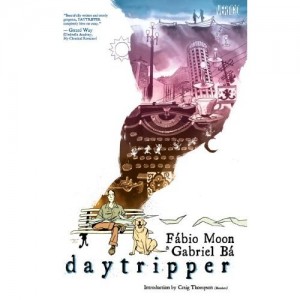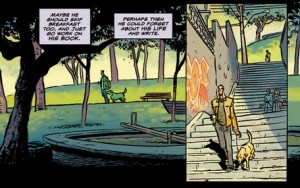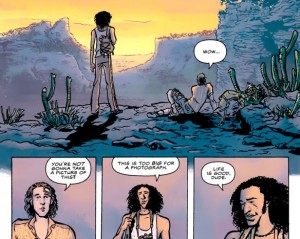
I’ve just finished reading the Vertigo (DC Comics) compilation of Fábio Moon and Gabriel Bá’s Daytripper, originally published in Brazil in 2010 as a 10-issue comic series. It is visually lush—expertly drawn and featuring a sensuous color palette by Dave Stewart (lettering by Sean Konot) — and attempts to ask good questions about the different routes a life can take, including the potential termination of these routes via depictions of the death of the protagonist, Brás, at key points in his life (page 28, 32, 41…). This conceit allows Moon and Bá to explore the “killing off” of a character’s development, without killing off the character himself, and it raises compelling questions about the places we do or do not find ourselves, the people we choose to embrace or dismiss, the work we choose to pursue or abandon.
My issue with the work, beautiful and promising as it is, concerns the textual, not the visual, elements. Since I actually weight the visual more heavily in graphic works, I try to avoid treating comics as standard text narratives, since this is nearly always a reduction of the comic. For this post, however, I am going to set the images aside, as I find the panels visually expressive, dense (in the best sense), and superior to that of many other comic works. This excellence, however, sharpens my disappointment in the verbal elements of Daytripper, which had the potential to be a complex and clever meditation on mortality, agency, and human interconnectivity. If the assertions of the narrator and the characters were as arresting as the images, we’d have a remarkable work here.
My chief complaint is this: if you want to take on that ever-present, usually repressed, incessantly itchy problem that we carry with us at all times –I am going to die. I am going to die? I am going to die!—then it seems important to explore it with something more than just seize-the-day, marry-the-girl-already platitudes. Okay, yes, I’m feeling an extra dose of crotchetiness about the marriage and reproduction imperative—really, must everyone partner for life and procreate? Must everyone dutifully replicate himself/herself and augment our bloated population? More pointedly, do those of us who resist or fail to tick these life boxes (married w/children) have no essential purpose in life? Is mating and reproducing essential to being alive, being an adult, creating a life of value? I’m not really sure what’s compelling this fierce trend, but it seems like this basic aspect of our animal life has become the telos of every recent essay, film, and narrative and advertisement I come across (okay, being a little hyperbolic here, but still), and can even be seen in odd ways, for example, the overwhelmingly large number of (sub)genres in the “movies about marriage” Netflix category, which is more than double the total of the second-largest category, “movies about royalty” (see Alexis Madrigal’s fascinating recent article in The Atlantic, “How Netflix Reverse Engineered Hollywood”).
Daytripper purports to be “deep.” It reveals—effectively, I’d add—nuances about its protagonist’s Oedipal struggles against a famous father, the melancholia of youth, the attractiveness of risk, the pull of desire, yet when it opines on life or on death, it offers nothing more than received ideas. Here’s an early example: “Then Brás woke up and realized that when you turn that corner, that future you have written and wished for is not always there waiting for you. In fact, it usually isn’t at all what you expected…. Around the corner there is just another big annoying question mark. It’s called life (35).” A little while later, Brás—in love—calls up a nugget of his father’s wisdom: “…[H]e remembers what his father had been saying all these years—and it all made sense (78).” Ahh, splendid. This ought to be good. Brás’ father is a writer, a major novelist who is feted, annually, at a literary gala held in his honor. Brás is also a writer, albeit one of lengthy obituaries at the moment. A writer reflecting on a writing father’s wisdom: certainly, there will be pith. Here’s what follows: “The moment that won’t fade. The moment we all search for. The moment that he found or that found him. Inside he knew. It felt right, and he knew. She was the woman he was going to spend the rest of his life with (78).” Thump.
As Brás dies in various dead-ends, he also ages, coming ever closer to a fulfilling existence—yep, as a husband, and a father—culminating in a clever time-out-of-time depiction of father-son rapprochement: a letter written by his dying father on the eve of Brás’ child’s birth is not received at its intended time, but, instead, years later when Brás himself is an old man diagnosed with a terminal condition (reminding me vaguely of Lacan’s conclusion in his seminar on Poe’s “The Purloined Letter” that a letter always reaches its destination).So, the circumstances are interesting: Brás is now old, it has been many years since the letter was written. What will it say? What does the great man say to the son? This:
Dear Son,
You’re holding this letter now because this is the most important day of your life. You’re about to have your first child. That means the life you’ve built with such effort, that you’ve conquered, that you’ve earned, has finally reached the point where it no longer belongs to you. This baby is the new master of your life. He is the sole reason for your existence…. You’ll surrender your life to him, give him your heart and soul because you want him to be strong…to be brave enough to make all his decisions without you. So when he finally grows older, he won’t need you. That’s becauseyou know one day you won’t be there for him anymore. Only when youaccept that one day you’ll die can you let go…and make the best out of life. And that’s the big secret. That’s the miracle. (242-243)
Sigh. So he writes, unknowingly confirming the life Brás has chosen to lead. All is well, we’re made to believe; Brás has extended his existence properly, and though ever flirting with death (self-inflicted or not), has managed not to succumb. I’m simplifying a bit; the text as a whole challenges some of these platitudes, even—if I am generous—twisting them ironically at points. But it all seems to add up to the usual counsel: young man, put away your toys, your dreams, your wishes for an exciting “future,” and accept the natural order of things. Take up your proper position as an adult (who will die, and knows he will die), a father whose child, whose son, no longer needs him. This is definitely coded male, but is as restrictive as any discourse that casts woman as limited to her reproductive function. Is this the message of the old to the young? Join us, become like us, young men and women, as soon as possible. We have given over our lives to the next generation, and you must do the same. Even if I step out of my nulliparous state and imagine myself a parent hearing this message, I am equally chagrined. Are we solely here to continue the species?
If Moon and Bá want to explore the question of death and our business here in life, it seems to me that they should push harder, tunnel further, scrape away the expected aspects of life (you will find a career, you will find a life mate, you will engender more life) and source their unique individual essences – the mind each has been given (and the fact that they are twins makes this an even more interesting potential gleaning), the one time combination of genes, experience, thoughts, sensations and feelings that animate Fábio and Gabriel and could imbue characters created by them (I know, I know; I’m nearly committing the intentional fallacy). There are millions of husbands and fathers out there; I don’t want to hear their general resumes distilled down to Brás as everyman. I want Brás to startle me with his insights, as the eponymous protagonist of David Mazzucchelli’s Asterios Polyp does when reflecting on memory, or as Mark C. Taylor does in his recent philosophical meditation on mortality, Field Notes from Elsewhere: Reflections on Dying and Living (Columbia UP, 2009).


